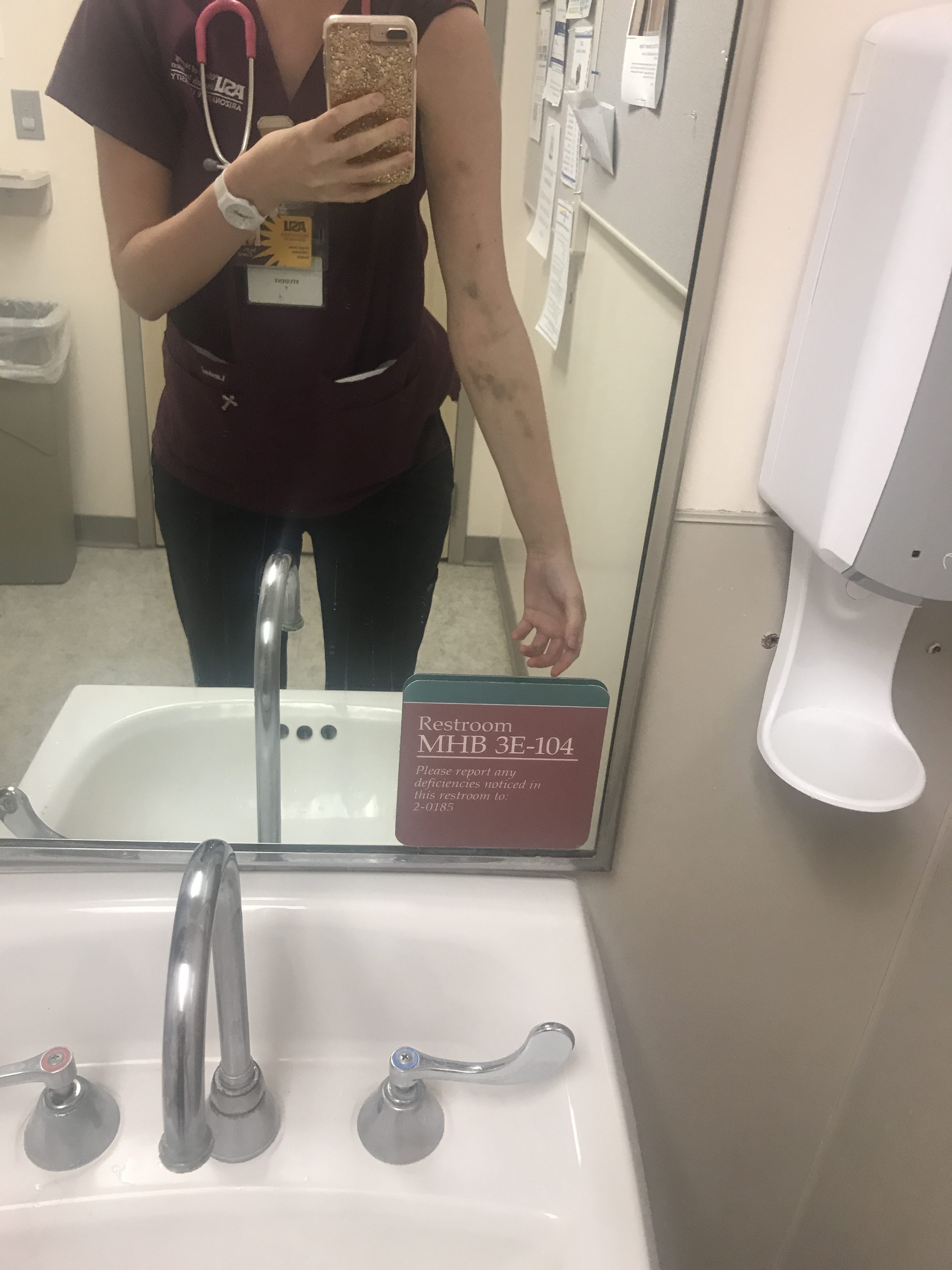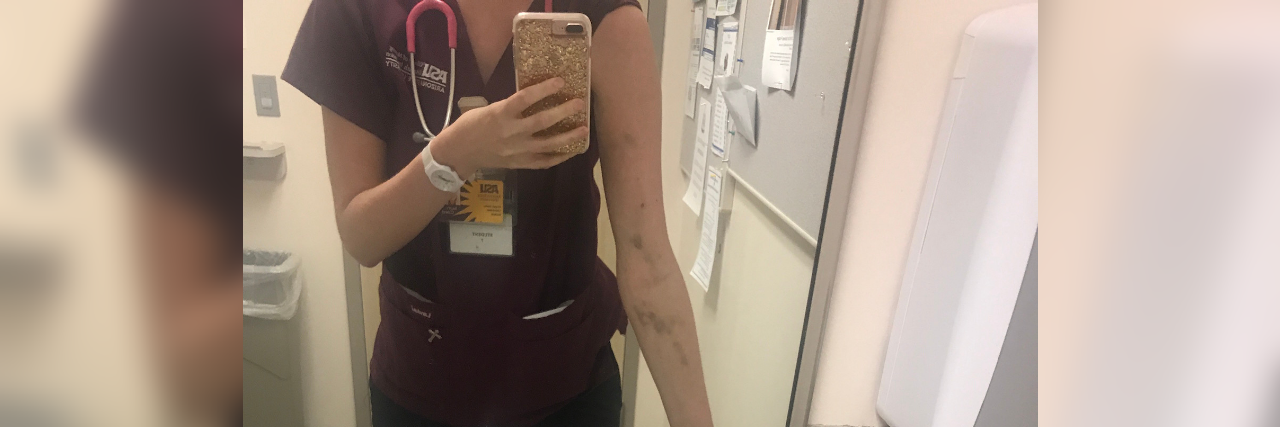I lay in a stretcher in the emergency department alone, trying to hold back tears. Just a few days prior I had been in this very hospital taking care of my patients as a nursing student. I knew this situation far too well. Not because I work in the hospital, but because most of my hospital experience has come from being a patient. My health had been declining for weeks. I knew my body. I knew something was wrong. But school had started again and I kept trying to convince myself that I was OK. That this was just a normal part of my many chronic illnesses. I tried my best to bury the pain and ignore my symptoms; after all I needed all my focus to be on school rather than my health.
I fought against myself for weeks until I found myself lying in a hospital bed. I knew I wasn’t OK. I knew the signs and the symptoms. After all I have been sick for eight years, and on top of that I am trained to know when to tell my patients to seek help for their health. But I knew that summoning myself to the emergency department would take me down an endless rabbit hole. When one thing goes wrong inside my body, everything else seems to follow. I didn’t have time for this. I don’t have time to get a cold, much less have something that has gone so awry in my body it has led me to the hospital. Nonetheless I found myself in the very place I fought so hard to avoid. The hospital where I worked at.
I loved working at this hospital, but I despised being a patient here. At the beginning of my illness I had an experience as a patient at one of the hospital’s other locations that gave me a diagnosis of PTSD from how I was treated. Because of that I was frightened to step foot back in any of their locations as a patient seeking care. I had no other choice. My doctor told me that my condition had gotten to the point where she didn’t have the capability to treat me any longer and because I was declining rapidly, she sent me to the hospital’s emergency department. I arrived alone and went through the process I knew far too well. Severe chest pain, vomiting, fever, weight loss, joint pain, spinal pain and migraines. This combination got me into a room fairly quickly. I knew what was to follow. Vitals, an EKG, chest X-ray, IV insertion, IV fluids and medications.
After this was all completed, the doctor came in and told me I had pericarditis. Exactly what I knew I had. I’ve had it before and knew the symptoms, it was no surprise. He told me I needed to be admitted, but in my head I thought those words were going to be “We’re discharging you to rest at home.” Instead I had to stay cooped up in a hospital room, missing clinicals that were necessary to pass. My stress and anxiety shot through the roof, but I had no other choice. I needed to accept the doctor’s orders and wait. All I wanted was to take care of myself, but I knew I had to draw the line. I was no longer a nursing student, but a patient.
Tests were run and they didn’t look too bad, but in the past when I’ve had pericarditis it has never been strongly represented on diagnostic tests so I wasn’t worried. I just wanted my HR out of the 170s and my chest pain to vanish. Instead they decided they wouldn’t treat my heart. Instead they would treat my lupus flare. Although my lupus had been flaring badly for the past six months, there was one lab that wasn’t as severe as the others, so they didn’t want to specifically call it a lupus flare. The rheumatologist came in and examined my joints, saw the swelling, saw the immobility of my right hand and confirmed that I had a lupus flare. The issue is that I am allergic to steroids, the main treatment for lupus flares. So he decided to add another anti-inflammatory immunosuppressant drug to the combo I was already on.
My pain was not being touched because every time they gave me oral pain medication I threw it up. They refused to give me pain medications through my IV, as it seemed clear they were treating me as a “drug-seeker.” Me, a drug-seeker who has documented pericarditis, a documented lupus flare, and a documented arthritis flare. I’ve been sick for eight years and suddenly I become a drug-seeker. I didn’t argue, I just took what they gave me and hoped I’d keep it down; most of the time I did not. They were giving me IV promethazine to keep the nausea at bay and it worked – it’s the only medication that works for my cyclic vomiting disease – but when it started ruining my IVs, they started to give it more sparingly until the point of completely stopping it. Now my pain wasn’t under control and my nausea wasn’t either. I was in pain, vomiting and crying because I wanted some sort of help.
A rounding doctor whom I’d never met before came in on a Sunday for rounds. She looked me up and down and said, “Well you don’t look sick.” Something I had heard far too often, but those words sting just as much as the first time I ever heard them. She sat down and said, “Your CRP isn’t that high, I don’t know if you’re actually flaring. And yet you have all this pain…” Livid, I looked her in the eyes and said, “You work in a hospital. You’ve never seen a chronically ill patient who doesn’t look ill before? What does lupus look like to you?” Stunned, she didn’t know what to say. So I continued, “Yes my CRP isn’t extremely elevated but my C4 and C3 are extremely low and that is how my body usually presents a lupus flare.” Again, she didn’t know how to respond. She finally gathered herself to ask how I knew what C3 and C4 meant. Now I was holding back tears trying to face this doubting practitioner: “I know my levels and what to check for. I know my body a lot more than you do. So yes, I’m flaring, and yes, the labs confirm that just as the extreme swelling in my joints. Your colleagues agree with me as well.” With that she got up, looked me up and down and said, “Well, I am no longer going to treat your nausea or pain, so you will be discharged.” And with that she shut the door.
I sat in my room crying and alone. I called my nurse in to talk about the past few inpatient days and what the nurse practitioner had just told me. She also questioned if I had been throwing up. I told my nurse and my nurse stated that I’d thrown up once. “No!” I said. I’ve thrown up six times and have kept it every single time like you had requested and rung my call light. Multiple nurses and CNAs came to look and took my emesis bags and threw them away. Apparently they hadn’t been documenting so I was made to look like I was lying. This whole admission had been a mistake and I couldn’t wait to get out. But sitting in that room made me even more driven than I already was to get out of the patient bed and back to treating my patients in that very hospital. Fuel was added to my fire to be the best nurse I can be, and take care of my patients in the exact opposite manor that I was taken care of during my admission.
Two days after I was discharged I was back working at the very hospital I spent a week as a patient at. I looked very fatigued, was in lots of pain and had very noticeable bruises and scabbed up arms from two to three IV tries a day. Surprisingly this invoked a conversation I had never had with my patients. It was hard to ignore my arms. I was actually quite embarrassed of them but they turned out to be a true blessing. My patients questioned me and I said I myself had just been discharged due to chronic health reasons. And with that, my patients opened up to me like never before.

In the middle of the shift when I was taking care of two extra patients while their nurse was on lunch, I started to arrange for a chaplain to come visit. As I was arranging that the nurse practitioner who had been so nasty a couple days before saw me. She saw me at my happiest, taking care of patients the way patients are supposed to be taken care of. I was proud. I was in pain but I was proud of what I had gone through and my ability to put my patients first no matter the circumstances. I hope when that nurse practitioner saw me taking care of my patients with the utmost respect and compassion they deserved, that she too would take a moment and rethink how she treated me, but most importantly how she will treat her future patients.

